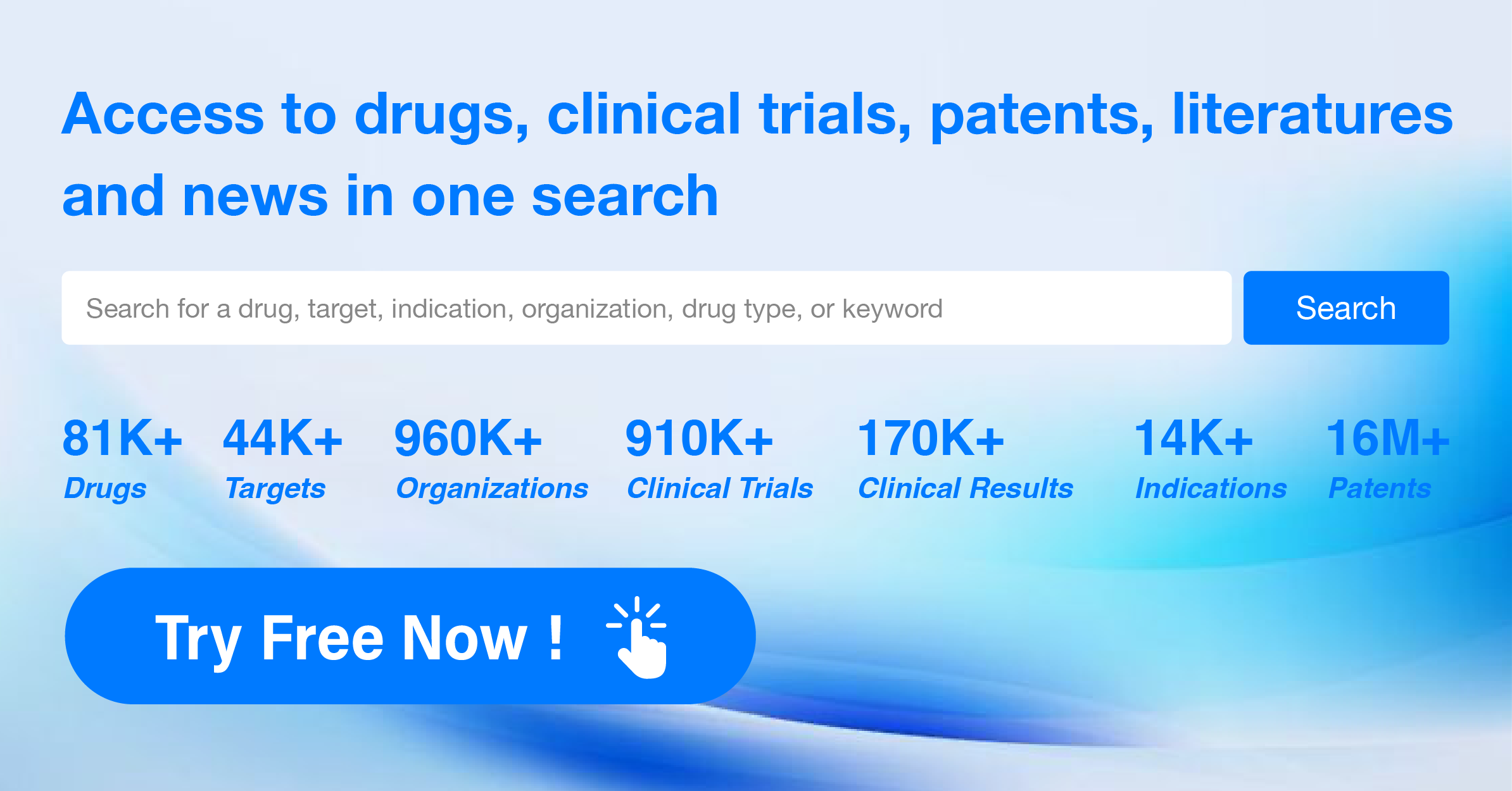Pharma Frontiers: Daily Digest of Global Pharmaceutical News - April 12
1.Phase II DESTINY-Lung05 Clinical Study Data of Trastuzumab Deruxtecan Published
Recently, at the 2024 AACR Annual Meeting, data from the phase II clinical trial DESTINY-Lung05 was revealed for the first time, pertaining to DS-8201a (trastuzumab deruxtecan) in Chinese patients with HER2-mutant advanced NSCLC who had previously received treatment. The DESTINY-Lung05 trial is an open-label, single-arm, phase II study designed to evaluate the efficacy and safety of DS-8201a in Chinese patients with metastatic non-squamous NSCLC harboring HER2 exon 19/20 mutations and disease progression after ≥1 lines of anti-cancer treatment (excluding HER2-targeted therapy). The primary endpoint was ORR as confirmed by ICR assessment. Secondary endpoints included ORR confirmed by investigator review (INV), DOR, DCR, PFS, and safety as confirmed by both ICR and INV evaluations.
As of September 23, 2023, a total of 72 HER2 mutant NSCLC patients received trastuzumab deruxtecan at a dose of 5.4 mg/kg, with a median follow-up time of 9.8 months. The results showed that the ORR confirmed by ICR was 58.3% (95%CI: 46.1-69.8), with 1 patient achieving CR and a cumulative 41 patients reaching PR. Among the secondary endpoints, the DCR confirmed by ICR assessment was 91.7%, consistent with the INV assessment result of 93.1%. The median DOR and median PFS evaluated by ICR have not yet reached the study endpoints but have shown significant improvement trends. The median DOR and median PFS confirmed by INV assessment were 9.0 months (95%CI: 7.2, NE) and 10.8 months (95%CI: 7.2, NE), respectively. In terms of safety, 51.4% of patients experienced drug-related adverse events of grade ≥3, the most common being neutropenia (26.4%) and thrombocytopenia (18.1%). Furthermore, the incidence of drug-related interstitial lung disease/pneumonia was low at 9.7%.
2.AstraZeneca Announces Positive Data for Small Molecule Brain Cancer Therapy
Recently, AstraZeneca revealed promising results from a global Phase I trial of their investigational ATM kinase inhibitor AZD1390 during the annual meeting of the American Association for Cancer Research (AACR). Analysis indicated that the therapy, when combined with standard radiation therapy, demonstrated controllable safety and showed preliminary efficacy in patients with recurrent and newly diagnosed glioblastoma (GBM). The disclosed study aimed to evaluate the safety, tolerability, early efficacy, and maximum tolerated dose of AZD1390 in conjunction with intensity-modulated radiation therapy (IMRT) in patients with GBM.
As of February 2024, the Phase I trial included 115 patients treated with AZD1390, comprising 75 patients with recurrent GBM in Group A and 36 patients with newly diagnosed GBM harboring unmethylated MGMT gene promoter (uMGMT) in Group C. Patients in both cohorts received progressively increasing daily doses of AZD1390; those in Group A underwent 10 fractions of 35 Gy IMRT over two weeks, while Group C had 30 fractions of 60 Gy IMRT over six weeks. Following the completion of IMRT, patients underwent an additional two weeks of adjunctive AZD1390 treatment.
Analysis showed an encouraging median overall survival (OS) of 12.7 months in Group A patients who reached the target dose, which is noteworthy considering that current standard treatments have been shown to achieve an OS of 6 to 10 months. The OS data for Group C are not yet mature. Among the 115 patients, 18 (15.7%) experienced Grade 3 or 4 AZD1390-related adverse events (AEs); there were no Grade 5 treatment-related adverse events reported. In addition, 4.3% of patients discontinued AZD1390 due to related adverse events. The majority of adverse reactions encountered during the study were of low grade, manageable, and reversible.
3.SmartNuclide's Recombinant Human Thyrotropin Injection Approved for Marketing
On April 11th, the National Medical Products Administration (NMPA) of China officially announced on its website that SmartNuclide's marketing application for Recombinant Human Thyrotropin Injection has been approved. Public records indicate that this product is a recombinant human thyrotropin injection solution (with the development code SNA001/KN040), and this approval is for its use in the radioiodine [131I] ablation of remnant thyroid tissue in patients with differentiated thyroid carcinoma without distant metastasis after total or near-total thyroidectomy.
Differentiated thyroid carcinoma accounts for about 95% of all thyroid cancer cases. The classic treatment for differentiated thyroid cancer involves surgery followed by 131I therapy and thyroid hormone suppressive therapy. Both postoperative diagnosis and 131I treatment require elevated levels of thyrotropin (TSH) in the body. Recombinant human thyrotropin (rhTSH) can quickly increase TSH levels within the body.
SNA001 was developed by SmartNuclide, with the pharmaceutical part developed by Alphamab. The main ingredient of this product is recombinant human thyrotropin (rhTSH), a protein identical to natural human thyrotropin. Early clinical studies have shown that the drug has good tolerability and safety, with pharmacokinetic (PK) parameters highly consistent with those of approved rhTSH drugs. According to a press release from SmartNuclide, compared to the traditional thyroid hormone withdrawal (THW) approach, the usage of SNA001 can safely and rapidly elevate serum TSH levels, achieving therapeutic requirements in only 1-2 days, thus shortening the waiting time for treatment. It can also meet the needs of special patients (those who cannot achieve the required TSH levels even after stopping thyroid hormone therapy). Additionally, using rhTSH does not require patients to stop taking thyroid hormones, therefore, avoiding hypothyroid symptoms such as weight gain, cold intolerance, and depression, thereby improving the quality of life for patients and reducing the risk of disease recurrence.
4.Genescience Pharmaceuticals' Application for Marketing of Canakinumab Injection Accepted
On April 11th, the official website of the Center for Drug Evaluation (CDE) of the National Medical Products Administration of China publicized that Genescience Pharmaceuticals' application for the marketing of Canakinumab Injection had been accepted. Publicly available information reveals that Canakinumab is a fully human monoclonal antibody against interleukin-1 beta (IL-1β).
According to the Chinese Clinical Trial Registry and Information Disclosure Platform, Genescience Pharmaceuticals is conducting a Phase III multicenter clinical study on this product, assessing its efficacy and safety in the treatment of acute gouty arthritis.
IL-1β is one of the most extensively studied members of the IL-1 family, primarily produced by monocytes and macrophages, and is also released by lymphocytes, neutrophils, endothelial cells, and fibroblasts. IL-1β is a typical pro-inflammatory cytokine that can induce the release of other inflammatory cytokines such as IL-6 and TNF-α and stimulate T-cell activation, triggering local and systemic inflammatory responses. According to literature reports, IL-1β plays a role in various autoimmune inflammatory reactions. For example, in patients with osteoarthritis, IL-1β stimulates the production of various metalloproteinases, leading to the disruption of connective tissue and inhibition of collagen synthesis, thereby adversely affecting the articular cartilage. Additionally, IL-1β directly and indirectly stimulates the maturation of osteoclasts, thus mediating the development of bone erosion in arthritis. IL-1 antagonists are already one of the clinically used treatments for gouty arthritis. Besides the Phase III study for acute gouty arthritis, researchers are also conducting several Phase II clinical studies on Canakinumab, targeting indications including the prevention of acute gouty arthritis attacks in patients during the initial stage of uric acid-lowering therapy and active systemic juvenile idiopathic arthritis, connective tissue disease-associated interstitial lung disease (CTD-ILD), and other indications.
5.Qilu Pharmaceutical's TPO receptor agonist Romiplostim biosimilar is approved for marketing
On April 11th, the official website of the National Medical Products Administration (NMPA) of China showed that the application for the marketing of Romiplostim, a TPO receptor agonist biosimilar developed by Qilu Pharmaceutical, has been approved. Publicly available information indicates that Romiplostim is a thrombopoietin (TPO) receptor agonist primarily used for the treatment of chronic immune thrombocytopenia (ITP).
Immune thrombocytopenia is a rare and serious autoimmune disorder characterized by low platelet counts in the blood, leading to severe bleeding events. In patients with ITP, the immune system attacks and destroys the body's own platelets, which play an active role in blood clotting and wound healing. Common symptoms of ITP include excessive bruising, bleeding, and fatigue. Individuals with chronic ITP face an increased risk of severe bleeding events, which may lead to serious complications or even death. Romiplostim is a recombinant protein belonging to the class of TPO receptor agonists. It stimulates intracellular transcription pathways by binding to the TPO receptor, resulting in increased platelet production. The medication is produced in Escherichia coli through recombinant DNA technology and can mimic the effects of the body's natural thrombopoietin, thereby raising platelet counts. Upon binding to the TPO receptor, it promotes the growth of megakaryocyte colony-forming units (CFU-Meg) and leads to increased platelet production through the JAK2 and STAT5 kinase pathways. The reference drug of Romiplostim has already been approved in China for the treatment of chronic immune thrombocytopenia.
According to an earlier press release from Qilu Pharmaceutical, the company carried out comprehensive structural, physicochemical properties and quality comparative studies, as well as stability comparison studies and similarity analysis of their injectable Romiplostim compared with the reference medicine. Trial data indicate that their developed Romiplostim biosimilar is consistent in quality, safety, and efficacy with the reference drug.
6.D2M Biotherapeutics' Class 1 Novel Drug Approved for Clinical Trials
On April 10, D2M Biotherapeutics announced that its first pipeline product, DM919, has recently been approved for clinical trials in China. According to the company's press release, DM919 is a pan-cancer checkpoint inhibitor monoclonal antibody that targets the MICA/B proteins. DM919 is a humanized monoclonal antibody targeting MICA/B proteins, independently developed by D2M Biotherapeutics. MICA/B proteins are recognized as NK/T cell checkpoint inhibitors. Literature reports indicate that the stress proteins MICA and MICB (MICA/B) are produced in large quantities when the human body experiences excessive DNA damage due to cancer. MICA/B is abundantly produced in a variety of cancer cells but is barely detectable in healthy cells, conferring its tumor specificity. Moreover, it can serve as a ligand to activate T cells and natural killer cells (NK cells), accelerating the immune system's elimination of tumors. CD8+ T cells can also interact with NKG2D and MICA/B to kill tumor cells that are deficient in Class I Major Histocompatibility Complex (MHC-I).
According to the press release from D2M Biotherapeutics, DM919 aims to reshape and enhance the suppressed NKG2D/MICA/B pathway in the tumor microenvironment, restoring the killing effect of NK and T cells on tumors. Since DM919 targets an immune mechanism that is complementary to PD-1, it holds promise for demonstrating strong monotherapy effects in tumors with low MHC-I expression that have poor response to conventional PD-1 inhibitor therapies, as well as improving the efficacy of tumor immunity when used in combination with PD-1 inhibitor products.
DM919 has previously been approved for clinical trials in the United States. Following this approval for clinical trials in China, D2M Biotherapeutics will conduct multi-center, open-label, dose-escalation, and expansion clinical trials in both China and the US to evaluate the safety and clinical activity of DM919 in patients with advanced solid tumors.
7.Vertex acquires Alpine for $4.9 billion to expand its autoimmunity pipeline
On April 10th, Vertex Pharmaceuticals and Alpine Immune Sciences jointly announced that the companies have reached a definitive agreement according to which Vertex will acquire Alpine for $65 per share in cash, totaling approximately $4.9 billion. The transaction has received unanimous approval from the boards of directors of both Vertex and Alpine and is expected to close later this quarter. Alpine’s lead molecule, povetacicept (ALPN-303), is a potent dual antagonist of the B-cell activating factor BAFF and a proliferation-inducing ligand APRIL. Advancing through Phase II development, povetacicept has demonstrated potential best-in-class efficacy for IgA nephropathy (IgAN), a serious progressive autoimmune kidney disease that can lead to end-stage renal disease. There are currently no approved therapies addressing the underlying cause of IgAN, which is the most common primary (idiopathic) glomerulonephritis worldwide and affects approximately 130,000 individuals in the United States. Povetacicept is expected to enter Phase III clinical development in the second half of 2024. Given its mechanism of action as a BAFF/APRIL dual antagonist, povetacicept could benefit patients with other severe autoimmune kidney diseases such as membranous nephropathy and lupus nephritis, as well as autoimmune cytopenia. Clinical studies focusing on kidney indications and autoimmune cytopenia are ongoing.




